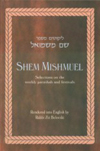 Marwan Barghouti & Hollywood’s Whitewashing of a Terrorist
Marwan Barghouti & Hollywood’s Whitewashing of a Terrorist
6 min read
Understanding the error of the Chashmonaim.
In a famous Gemara, Chazal describe the situation in the Beis HaMikdash at the time of the Chanukah story, after the Greeks had been repelled and the Jews had gained control:
There was only enough oil [with which to light the Menorah] for one day, but a miracle occurred, and it lasted for eight days [until fresh oil could be prepared]. (Shabbos 21a)
Rabbi Yosef Karo, the author of the Shulchan Aruch, raises a difficulty with the above Chazal:
Since there was sufficient oil for one day, the miracle only happened on seven days. Why, then, were eight days of Chanukah instituted to recall the miracle, when seven should be enough? (Beis Yosef, Orach Chaim 770)
Many solutions have been suggested to this problem, but I would like to propose the following: Everything in the physical world is by definition finite; that is, it can be limited by dimensions. There are six directions - north, south, east, west, up, and down - which together describe the three dimensions of the physical world. Everything, without exception, fits into this three-dimensional picture. All objects occupy a certain space which can be entirely described by coordinates in these dimensions. No tangible entity can in any way break out of its physical limitations.
* * *
MIRACLES
Let us now consider the world of miracles. The Hebrew word for "miracle" is neis. This word has another meaning, as in the verses:
Set up the banner [neis] toward Tzion. (Yirmeyahu 4:6)
Behold, I will lift up My hand to the nations and set up My banner [nisi] to the peoples. (Yeshayahu 49:22)
Since all similar Hebrew words have the same basic meaning, we can say that a miracle is similar to a banner in the following way: Just as a banner is lifted up for all to see, so too, the subject of the miracle is raised above its natural physical confines. So we see that an object can function in its normal environment, confined by the laws of nature, or it can shed its natural constraints through a miraculous event.
We can apply this idea to the oil in the Menorah at the original Chanukah. In its intrinsic state the oil could provide light for just one day. However, a miracle occurred, raising the oil beyond its natural condition. Thus, unbounded by the laws of nature, the oil gained new properties and was able to burn for eight days. In fact, had it been necessary, the oil could have lasted for still longer. However, miracles only persist for as long as they are required, and it ceased as soon as fresh oil was made available.
So we see that for all eight days of Chanukah, miracle oil rather than natural oil burned in the lamps of the Menorah. Since each day, therefore, was a separate miracle, Chazal instituted a corresponding eight-day celebration.
* * *
THE ERROR OF THE CHASHMONAIM
Using this concept, we will now deal with another problem. When Yaakov addressed his sons at the end of his life, part of his blessing to Yehudah was:
The scepter shall not depart from Yehudah. (Bereishis 49:10)
This means that the Jewish kingship was permanently given to the tribe of Yehudah. However, during the time of the second Beis HaMikdash, after the Chanukah miracle, the Chashmonaim, who had led the anti-Greek revolt, retained control of the kingship, even though they were kohanim. This contradiction of Divine rule had harsh consequences, as the Ramban explains:
This explains the punishment of the Chashmonaim, who reigned at the time of the second Beis HaMikdash. For even though they were tremendously pious, and had it not been for them the Jews would have forgotten the Torah and the mitzvos, they were nevertheless dealt a severe punishment. For this sin they were entirely wiped out. (Ramban loc. cit.)
It is very hard for us to imagine how such great leaders, men who had saved the Jewish nation by their valiance, could transgress a clearly stated Torah principle. Not only that, but it is reasonable to say that the Chashmonaim acted with the consent of the Sanhedrin and, by extension, the whole Jewish people, and we have no evidence to suggest that any objection was raised to their reign. It is also problematic to suggest that while the heroes of the war were righteous, their descendants were not, and so they took the kingship. The Gemara explicitly refers to the victors themselves as the "kingship of the House of the Chashmonaim," implying that they actually ruled as kings.
However, we can suggest a solution to this quandary based on our discussion above. As with the oil, the victory in the war against the Greeks was a great miracle. The Chashmonaim risked their lives, prepared to die for the holiness of God's name and His Torah. A tremendous miracle occurred, and they won the war against all odds. Like the oil, the Chashmonaim were, by the fact of the miracle, raised above their natural physical boundaries and limitations, which enabled them to succeed in their mission. We could say that they were no longer subject to general mortal law, as they then existed on a higher plane.
In Devarim, Moshe Rabbeinu is described as:
...a king in Yeshurun. (Devarim 33:5)
So Moshe was a king, even though he was a Levi. His existence was spiritually so far removed from the rest of Yisrael that he could be king without transgressing the directive of Yaakov, even though for any other Levi it was prohibited.
Perhaps we can say that the original Chashmonaim were also permitted to be kings of Yisrael. Since their victory symbolized the rejection of Greek wisdom and its replacement by Torah, the ultimate wisdom, they, too, were raised to supernatural levels of wisdom, akin to that of Moshe himself. It was not they who sinned by taking the kingship, since they were no longer subject to the strictures of the Torah. It was the later generations of Chashmonaim, who retained control of the throne, who were at fault. They failed to realize (or admit) that their circumstances were different from those of their predecessors and that they, like all other Jews, were subject to the word of the Torah. For this reason, explains the Ramban, the great Chashmonaim had to be severely punished.
May God save us from trouble, and may we merit to see the reemergence of the Davidic dynasty!
 Excerpted from Shem MiShmuel by the Sochatchover Rebbe, rendered into English by Rabbi Zvi Belovski, published by Targum Press. Click here to order.
Excerpted from Shem MiShmuel by the Sochatchover Rebbe, rendered into English by Rabbi Zvi Belovski, published by Targum Press. Click here to order.
